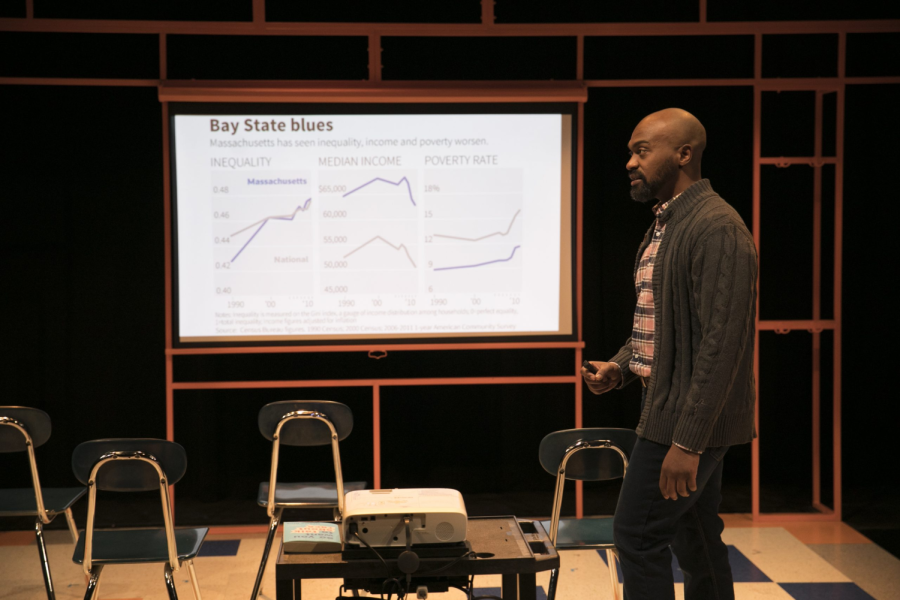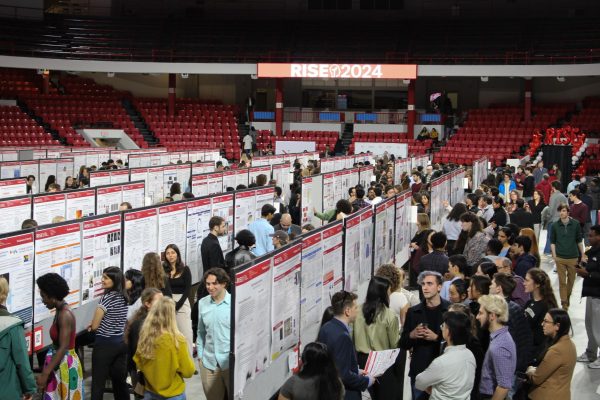‘Mr. Parent’ celebrates educators, condemns systemic inequality
“Mr. Parent” is a one-man show highlighting fundamental issues in the Boston Public School system. Photo credit to Mark S. Howard.
February 17, 2022
A one-man show that recently made its world premiere at the Lyric Stage Company of Boston is challenging audiences to re-examine the Massachusetts education system. “Mr. Parent” tells the true story of teacher-by-day, actor-by-night Maurice Emmanuel Parent. Playing himself, Parent spends the 90-minute solo show recounting the highs and lows of his five years as a Boston Public School teacher.
Written by Melinda Lopez, a Northeastern professor of the practice, in conjunction with Parent and directed by Megan Sandberg-Zakian, who has taught classes in the Northeastern Department of Theatre, the concept for the show was born in 2018.
At the time, Sandberg-Zakian and Parent were working together on a production of “Skeleton Crew,” a Dominique Morriseau play about the people of a small Detroit auto plant, at The Huntington Theatre Company. Parent had recently resigned from his teaching career, but he continued to entertain colleagues with stories about his students.
“During the rehearsal process, every time we had a break he was just talking about the kids,” Sandberg-Zakian said. “The stories that he was telling were so funny and heartbreaking and amazing that I started writing them down.”
The pair brought the idea to Lopez, who immediately agreed to turn the anecdotes into a play. Bringing “Mr. Parent” to life was a highly collaborative process, with all three artists working as a team to develop the script, staging and performance.
“There’s no one person that makes a piece of theatre, ever,” Lopez said. “It’s only gonna be better when you have more collaborators.”
Sandberg-Zakian explained that a major goal of the show is to validate the experiences of Boston educators.
“I hope the general audiences take away how much we are asking of teachers in the Boston Public Schools specifically,” she said. “For audience members who know that experience first-hand, I hope that they come out of it feeling seen and heard and not alone.”
The team wanted to ensure that their portrayal of the education system was as truthful as possible. They invited Neema Avashia, who has been a Boston Public Schools civics teacher for 16 years, to serve as the team’s public education consultant. Avashia provided the team with historical context and data on Massachusetts public schools.
“This play really speaks to the humanity of educators and how often they feel like the system they’re working in doesn’t support them,” Avashia said. “It was painful to watch that truth get named.”
Throughout “Mr. Parent,” the titular character struggles to find a balance between his two lives as a teacher and actor. Ultimately, Parent is forced to leave his teaching career in order to pursue his artistic passions. Avashia said she hopes that this conflict illuminates how the current educational structure asks too much of its teachers.
“We have a school system that’s predicated on people being superheroes. The way that schools are structured doesn’t really center the humanity of any of us,” she said. “Can we create a system where it’s possible for people to be whole and human in everything they do?”
Sandberg-Zakian said she believes that the first step toward this new system is changing the perception of Massachusetts public schools, which was ranked first in the U.S. by Forbes for safety, quality and reading and math test scores.
“I would like to see residents of Massachusetts release this story of being good, being perfect, being number one,” she said. “It’s about gently prying that narrative away from people and offering them an alternative narrative about constantly striving towards something better. If we can do that we’ve done our job.”
Avashia and Lopez agree that teachers are not the only ones negatively affected by public education. The current method of funding public schools creates inequities between wealthy, white suburban areas and impoverished urban communities with increased numbers of marginalized demographics. Students in different towns don’t have access to the same resources or quality of education.
“We cannot continue to utilize a school funding mechanism where property taxes are the driving factor,” Neema said. “Our state is deeply segregated.”
Lopez suggested that one concrete tactic to combat disparity could be a reevaluation of this system.
“Changing the way schools are funded from local to statewide is one very practical thing to look at,” she said.
“Mr. Parent” and the team behind the production hope to be a part of this change. Though the show took its final in-person bow Feb. 6, it is available to stream until Feb 20.
“This play was crafted for the here and now. It was made for Massachusetts and certainly Boston,” Sandberg-Zakian said. “We made a play that we, as people, felt was really vital.”
Editor’s note: The headline was updated Friday, Feb. 18 at 1:05 p.m. to more accurately reflect the production.


















